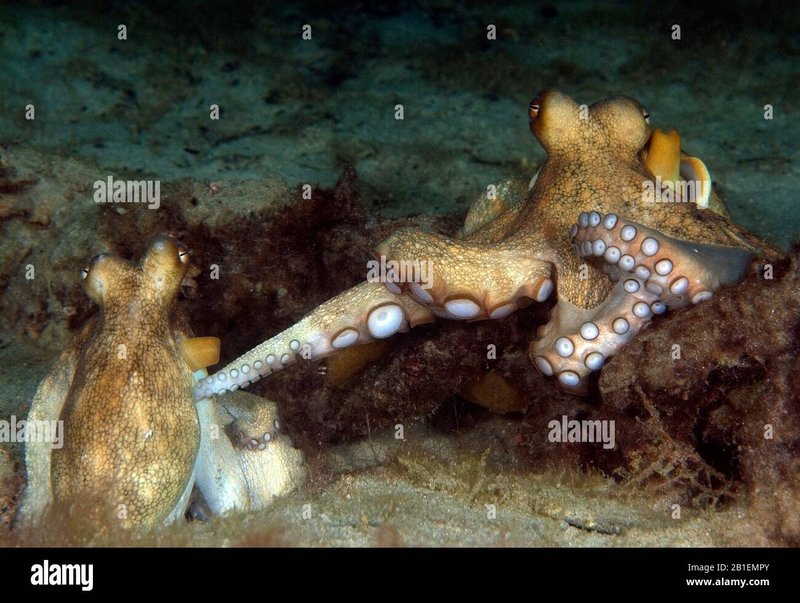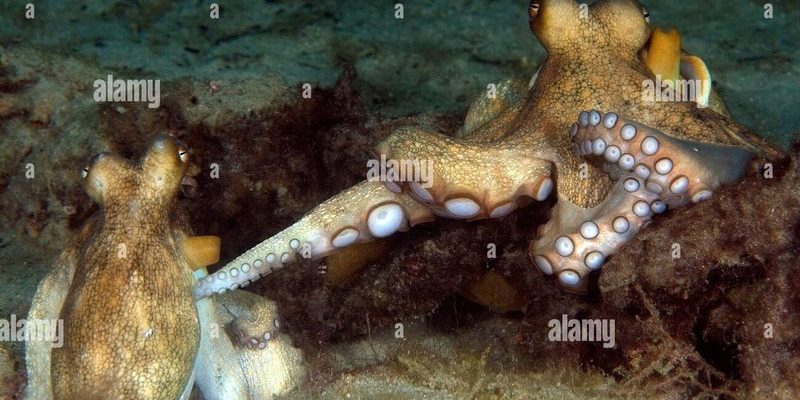
You might be wondering why octopus reproduction is so captivating. Well, for starters, it’s quite different from what you might expect from most animals. These creatures have a brief but intense breeding season, typically followed by a rather tragic outcome for the female. Just like a flower blooming in spring only to drop its petals by summer, the life cycle of an octopus is both spectacular and fleeting. So, grab a cup of coffee and let’s unravel the mysteries of octopus breeding and reproduction together.
Understanding Octopus Mating Behavior
Octopuses are known for their unique mating rituals, which can feel like a dance between two potential partners. Before they mate, the male octopus often goes through a series of advanced courtship displays. He might change his color and texture to impress the female—talk about a fashion show underwater! This display not only showcases his health and vitality but also helps set a calm mood for both parties.
Once the female is receptive, the male uses one of his specialized tentacles, called a hectocotylus, to transfer sperm packets called spermatophores. He delicately places them in her mantle cavity, which is a protective space in her body. You might think of this like delivering a surprise package; it’s hidden away for a time until it’s ready to hatch into something beautiful.
How Many Eggs Do Octopuses Lay?
Now, you might be asking yourself, “How many eggs can one octopus produce?” The answer is quite astonishing. Depending on the species, a female octopus can lay anywhere from 20,000 to 100,000 eggs in a single breeding season. Imagine the space needed for all those tiny eggs! The female carefully selects a safe spot to lay them, often inside a rocky crevice or a cozy den.
After laying her eggs, she goes into a protective mode. She’ll spend months guarding them, keeping a close watch while keeping them clean and oxygenated. Picture her like a devoted parent on watch, ensuring everything is just right. Unfortunately, this dedication comes with a high price. Once the eggs are ready to hatch, the female usually dies shortly afterward, having given up all her energy to nurture the next generation.
The Life Cycle of an Octopus
Once the eggs hatch, they release tiny creatures known as larval octopuses. This stage of life is a bit wild; they’re free-floating and often drift with ocean currents. As babies, they are incredibly vulnerable, trying to find their own food and avoid predators. This phase can last several weeks to months, depending on environmental conditions.
When they finally find a suitable habitat, they settle down and begin to grow into juvenile octopuses. At this stage, they start to develop their distinctive features, including their ability to change color and texture. In a way, it’s like watching a teenager transform into an adult, gaining independence and personality along the way. Over the next few years, they will continue to grow until they reach adulthood, where the cycle starts all over again.
Octopus Species Variations in Reproduction
Different octopus species have varying reproductive strategies and behaviors. For instance, the common octopus (Octopus vulgaris) has a relatively short lifespan, often reproducing just once before dying. On the other hand, the Giant Pacific octopus can have a much longer lifespan and can reproduce multiple times over its life.
Here’s where it gets interesting: some species can even store sperm for future use, allowing them to fertilize their eggs much later. This ability provides flexibility when environmental conditions aren’t ideal for raising young. It’s like having a backup plan when things don’t go as expected.
Challenges in Octopus Reproduction
Despite their remarkable reproductive adaptations, octopuses face several challenges during their breeding process. Pollution, habitat destruction, and climate change have taken a toll on marine ecosystems, affecting food availability and safe nesting sites for these creatures.
Additionally, as the ocean warms, the timing of their breeding can be disrupted. This can lead to mismatches between the hatching of eggs and the availability of food sources for the young octopuses. It’s an intricate dance of timing and environmental conditions, and when one factor is out of sync, it can have significant consequences for their populations.
Conservation Efforts for Octopuses
Given the challenges facing octopus populations, conservation efforts are essential. Many organizations are working to protect marine habitats and promote sustainable fishing practices. These initiatives are crucial not just for octopuses but for the entire ocean ecosystem.
You might wonder how you can help. Simple actions like supporting sustainable seafood choices, reducing plastic use, and spreading awareness about ocean conservation can make a difference. Every effort counts when it comes to preserving the rich biodiversity of our oceans.
The Fascinating Future of Octopus Research
As our understanding of octopuses grows, so does our appreciation for their unique breeding and reproductive behaviors. Researchers are diving deep to learn more about their intelligence, adaptability, and intricate life cycles. With advancements in technology, scientists can now observe these creatures in their natural habitats like never before.
This research not only helps us understand octopus reproduction better but also educates us about the larger marine ecosystem. The more we know, the better equipped we are to protect these extraordinary beings and their environments. It’s a win-win for both science and nature!
In conclusion, the breeding and reproduction of octopuses are as mesmerizing as the creatures themselves. From their complex mating dances to the heart-wrenching sacrifices of the females, there’s a depth to their life cycles that’s both beautiful and tragic. As we learn more about these incredible animals, it becomes even more important to safeguard their future, ensuring that these underwater wonders continue to thrive in our oceans. Whether you’re a marine enthusiast or just curious about the ocean’s mysteries, there’s always something new to discover about octopuses!

